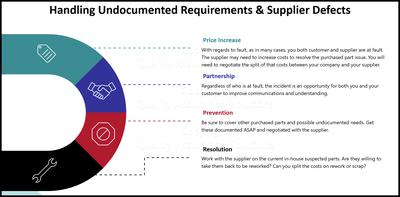Complaint or Not a Complaint
by Mihail Opra
(Deva Romania)

One of my supplier sent me a Finished Good that created a functional problem after it was assembled .
When I complained to supplier regarding the defective parts , the answer was that this defect type hasn,t been considered when the process Control Plan has been agreed and therefore he has no liability in issuing the defective parts because the defect could not been detected as per Control Plan.
Is this a fair answer from my supplier?
Thanks,
Mihail Opra
Comments for Complaint or Not a Complaint
|
||
|
||
|
||
|
||
|
||
|
||
|
||
|
||
|
||
|
||
|
||
|
||
|
Software, Videos, Manuals, On-Line Certifications | ||
|
An Organizational Task Management System. Projects, Meetings, Audits & more | ||
|
Corrective Action Software | ||
|
Plan and Track Training | ||
|
AQL Inspection Software |
|
450+ Editable Slides with support links | ||
|
Learn and Train TRIZ | ||
|
Editable Template | ||
|
Templates, Guides, QA Manual, Audit Checklists | ||
|
EMS Manual, Procedures, Forms, Examples, Audits, Videos | ||
|
On-Line Accredited Certifications Six Sigma, Risk Management, SCRUM | ||
|
Software, Videos, Manuals, On-Line Certifications |













